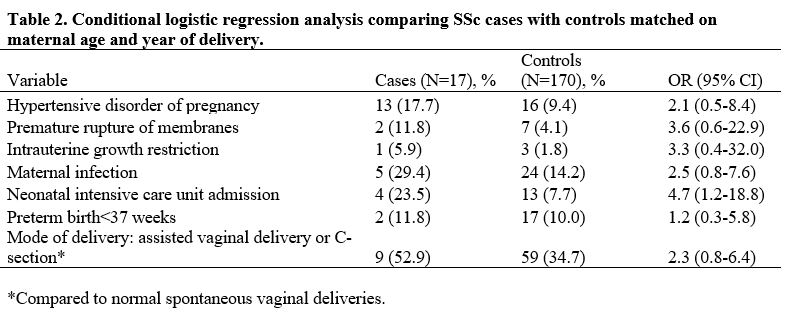Session Information
Session Type: Poster Session A
Session Time: 9:00AM-11:00AM
Background/Purpose: Vasculopathy and immune dysfunction likely precede the diagnosis of systemic sclerosis (SSc) by years as evidenced by longstanding Raynaud’s phenomenon prior to diagnosis. Poor obstetric outcomes may also reflect underlying vascular and immune system abnormalities in patients who later develop SSc. We investigated whether obstetric complications prior to SSc diagnosis are more common compared to the general obstetric population.
Methods: A retrospective case-control study was conducted among Kaiser Permanente Northern California (KPNC) pregnant women with subsequent SSc diagnosis (2013 ACR-EULAR classification criteria confirmed by chart review) from 2007-2016. Controls from the general obstetric population were matched 10:1 by maternal age and year of delivery. Exposures of interest included hypertensive disorders of pregnancy (including pre-eclampsia, eclampsia, and gestational hypertension), premature rupture of membranes (PROM), intrauterine growth restriction (IUGR), maternal infections, neonatal intensive care unit (NICU) admission, and preterm birth. Fischer’s exact tests were used to compare categorical variables. Conditional logistic regression models estimated the odds ratio (OR) and corresponding 95% confidence intervals for the outcome SSc.
Results: Median maternal age at delivery was 34 years (range 23-46 years) for 17 SSc cases and 170 matched controls (Table 1). Median time from delivery to SSc diagnosis was 2 years (range 0.2-7.3 years), with 13/17 developing limited cutaneous disease. Compared to controls, SSc cases were more likely to be Hispanic and Black. Obstetric complications were non-significantly higher in women with an eventual SSc diagnosis compared to controls, including hypertensive disorders (17.7% vs. 9.4%), PROM (11.8% vs. 4.1%), IUGR (5.9% vs 1.8%), maternal infection (29.4% vs. 14.1%), NICU admissions (23.5% vs. 7.7%), and preterm birth (29.4% vs. 21.8%). Women with a subsequent diagnosis of SSc were found to have twice the odds of having hypertensive disorders of pregnancy compared with controls, but the results were not statistically significant). Cases had a significantly higher odds of delivering infants requiring NICU admission (Table 2).
Conclusion: Women who eventually develop SSc appeared to have more pregnancy complications, particularly NICU admissions, before overt diagnosis. Larger studies are needed to validate these findings.
 Table 1: Baseline characteristics of cases and controls.
Table 1: Baseline characteristics of cases and controls.
 Table 2: Conditional logistic regression analysis comparing SSc cases with controls matched on maternal age and year of delivery.
Table 2: Conditional logistic regression analysis comparing SSc cases with controls matched on maternal age and year of delivery.
To cite this abstract in AMA style:
Chung M, Kolstad K, Dontsi M, Manwani P, Zhao H, Postlethwaite D, Kesh S, Simard J, Chung L. Increased Rates of Obstetric Complications Prior to Systemic Sclerosis Diagnosis [abstract]. Arthritis Rheumatol. 2020; 72 (suppl 10). https://acrabstracts.org/abstract/increased-rates-of-obstetric-complications-prior-to-systemic-sclerosis-diagnosis/. Accessed .« Back to ACR Convergence 2020
ACR Meeting Abstracts - https://acrabstracts.org/abstract/increased-rates-of-obstetric-complications-prior-to-systemic-sclerosis-diagnosis/
